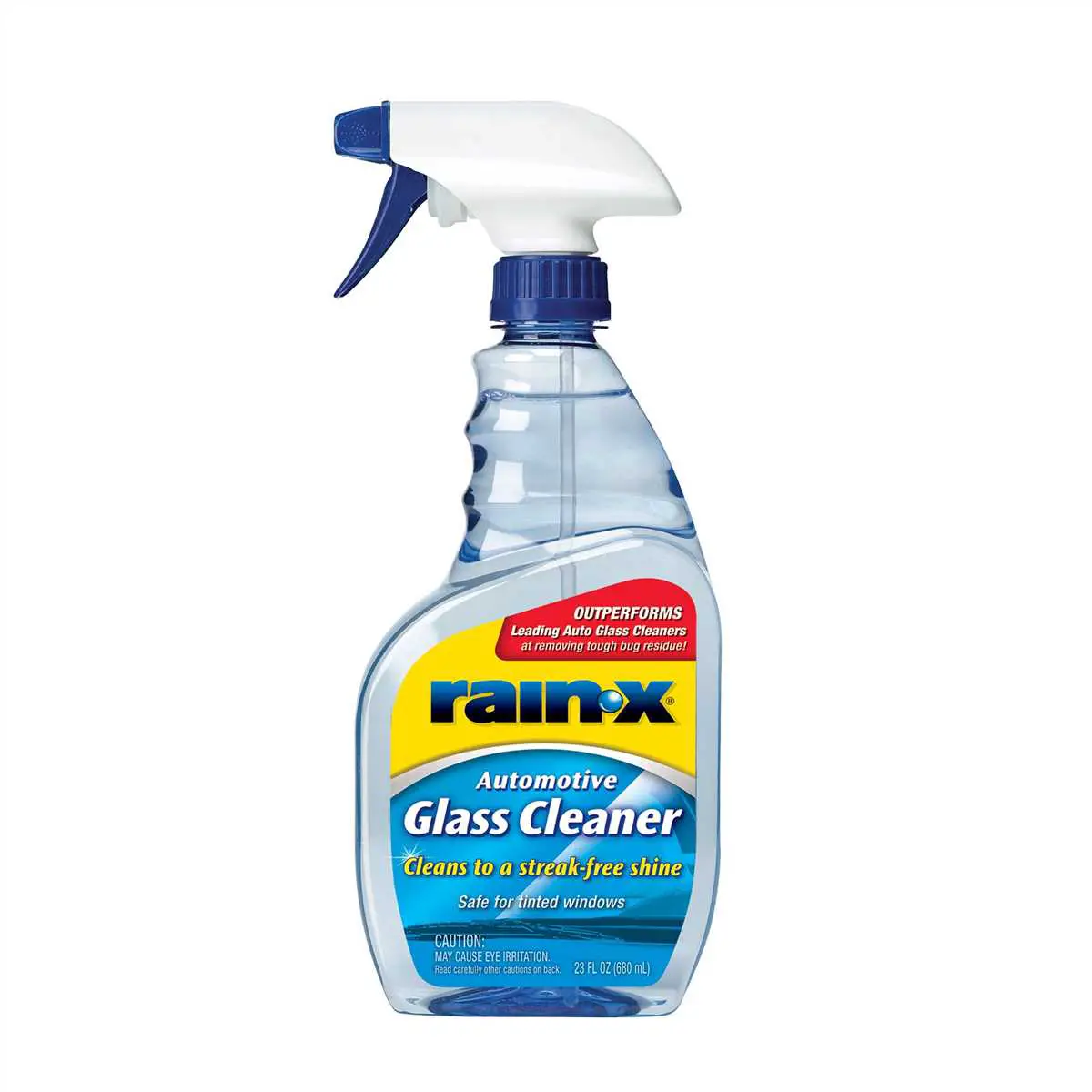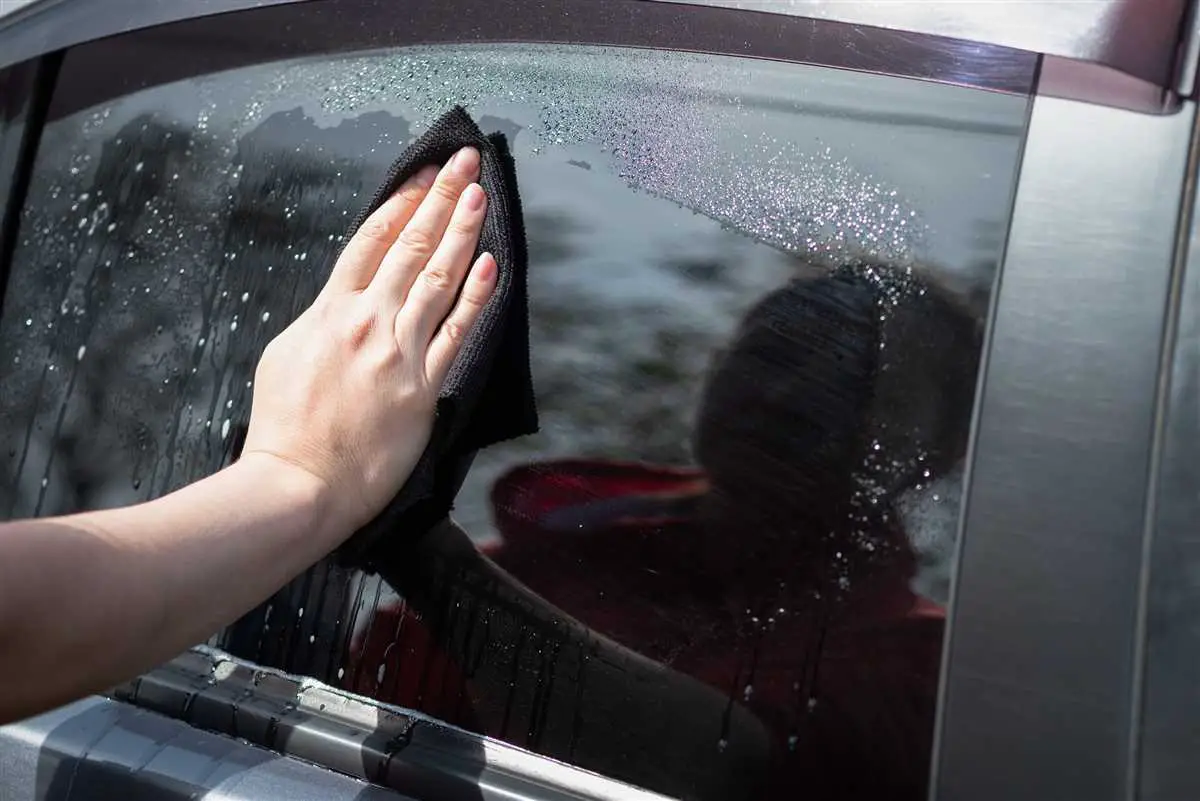Last Updated on February 11, 2024 by Vadym

Tinted windows are a popular addition to many vehicles, as they provide numerous benefits such as privacy, heat reduction, and protection from harmful UV rays. But when it comes to cleaning tinted windows, many car owners are unsure about which products are safe to use. One common question that arises is whether or not glass cleaner can be used on tinted windows. In this article, we will explore this topic and provide you with the necessary information to keep your tinted windows clean and in great condition.
Firstly, it’s important to understand that not all glass cleaners are suitable for use on tinted windows. Some glass cleaners contain harsh chemicals and solvents that can damage the tint film, causing it to peel, bubble, or discolor over time. These cleaners may also leave behind residue that can interfere with the clarity and effectiveness of the tint. Therefore, it’s crucial to choose a glass cleaner that is specifically formulated for use on tinted windows.
Fortunately, there are many tint-safe glass cleaners available on the market. These cleaners are explicitly designed to be gentle on tinted windows while still effectively removing dirt, grime, and smudges. They typically do not contain ammonia or alcohol, which are common ingredients in regular glass cleaners that can be harmful to tinted windows. Instead, they use a milder formula that is safe for use on tinted surfaces.
When cleaning tinted windows, it’s essential to use the right technique as well. Start by spraying the tint-safe glass cleaner onto a clean microfiber cloth rather than directly onto the window. This will help prevent overspray onto the surrounding areas, such as the upholstery or dashboard, which can also be damaged by certain cleaning products. Gently wipe the cloth over the window, making sure to remove all dirt and residue. Avoid using excessive pressure or abrasive materials that may scratch or damage the tint film.
In conclusion, while it’s crucial to keep your tinted windows clean, not all glass cleaners are suitable for use on them. Using a glass cleaner that is specifically formulated for tinted windows will ensure that your windows remain in excellent condition without any damage or discoloration. By following the proper cleaning technique and using the right products, you can enjoy the benefits of tinted windows while keeping them looking clean and clear.
The Concept of Tinted Windows

Tinted windows refer to the windows of a vehicle that have been treated with a thin layer of tint film. This film is applied to the inside or outside surface of the window and serves several purposes.
One of the main reasons why people choose to have their windows tinted is for privacy. Tinted windows can greatly reduce the visibility from the outside, making it difficult for others to see the occupants or belongings inside the vehicle. This can be particularly beneficial for celebrities, high-profile individuals, or anyone looking to enhance their privacy and security.
Another important reason to have tinted windows is for protection against the sun’s harmful UV rays. The tint film applied to the windows acts as a barrier, blocking a significant amount of UV radiation from entering the vehicle. This helps to protect the occupants from potential health risks associated with prolonged sun exposure, such as skin cancer and premature aging.
Tinted windows can also provide relief from the heat by reducing the amount of solar heat that enters the vehicle. The tint film can reflect a portion of the sun’s heat away from the window, preventing the interior from becoming hot and uncomfortable. This can help to improve the overall comfort of the occupants, especially during hot summer months.
Moreover, tinted windows can also enhance the aesthetic appeal of a vehicle. The addition of a tint film can give a sleek and sophisticated look to any car, making it stand out from the crowd. Many people choose to have their windows tinted as a way to customize and personalize their vehicle.
It is important to note that while tinted windows offer numerous benefits, there may also be regulations and restrictions regarding the level of tint that can be applied to vehicle windows. These regulations vary by country, state, and even municipality. Therefore, it is recommended that individuals consult their local laws before having their windows tinted to ensure compliance.
In conclusion, tinted windows provide various advantages such as increased privacy, protection against UV rays, heat reduction, and enhanced aesthetic appeal. However, it is crucial to be aware of any regulations and restrictions regarding window tinting to avoid any potential legal issues.
Benefits of Tinted Windows
Tinted windows offer numerous benefits, making them a popular choice for many vehicle owners. Here are some of the advantages of having tinted windows:
1. Enhanced Privacy: Tinted windows provide an extra layer of privacy by limiting the visibility into the vehicle. This is especially beneficial for people who often carry valuable items in their cars or prefer not to be easily seen by others.
2. Protection from Harmful UV Rays: Tinted windows can block up to 99% of the harmful ultraviolet (UV) rays from the sun. This helps protect the vehicle’s interior from fading, cracking, and other damage caused by prolonged exposure to the sun.
3. UV Ray Protection for Occupants: In addition to protecting the vehicle’s interior, tinted windows also shield the occupants from the harmful effects of UV rays. Prolonged exposure to UV rays can lead to skin cancer and other health problems, so tinted windows provide an added layer of protection.
4. Heat Reduction: Tinted windows can significantly reduce the amount of heat that accumulates inside the vehicle, especially during hot summer months. This helps create a more comfortable driving experience and reduces the reliance on air conditioning, resulting in potential fuel savings.
5. Glare Reduction: Tinted windows help reduce glare from the sun, headlights, and other sources of bright light. This improves visibility, especially during driving and can help prevent eye strain, making the driving experience safer and more comfortable.
6. Shatter Resistance: Tinted windows have a thin film that helps hold the glass together in the event of an accident or breakage, providing added safety by reducing the risk of shattered glass flying into the vehicle and causing harm to the occupants.
7. Aesthetic Appeal: Tinted windows can enhance the overall appearance of a vehicle. The sleek, darkened look adds a touch of elegance and style, giving any car a more sophisticated and attractive appearance.
Overall, tinted windows offer a range of practical benefits, including enhanced privacy, protection from UV rays, heat reduction, improved visibility, and added safety. With these advantages, it’s no wonder why many vehicle owners choose to have their windows tinted.
Potential Risks of Using Glass Cleaner on Tinted Windows
While glass cleaner may seem like a convenient option for cleaning your car’s tinted windows, it can actually pose several risks that may outweigh its benefits. Here are some potential risks to consider:
- Fading or discoloration: Tinted windows are coated with a thin layer of film that provides heat and UV protection, as well as privacy. Using glass cleaner that contains ammonia or other harsh chemicals can degrade this protective film over time, causing it to fade or become discolored.
- Damage to window seals: Glass cleaners often contain ingredients that can be harmful to rubber and vinyl materials. If these chemicals come into contact with the window seals, it can cause them to deteriorate, leading to air and water leaks.
- Streaking and residue: Some glass cleaners can leave behind streaks or residue on the tinted windows, which can affect visibility and make the windows look unclean. This can be especially problematic when driving at night or in low-light conditions.
- Voiding warranty: Using a glass cleaner on tinted windows may void the warranty provided by the manufacturer or installer. It’s important to check the warranty terms and conditions before using any cleaning products to avoid any potential issues.
- Health concerns: Certain ingredients commonly found in glass cleaners, such as ammonia and solvents, can emit strong fumes that can irritate the eyes, nose, and throat when used in enclosed spaces. It’s essential to ensure proper ventilation when cleaning tinted windows with glass cleaner to minimize potential health risks.
Given these potential risks, it is advisable to use cleaning products specifically designed for tinted windows. These products are generally formulated to be gentle on the tinted film while effectively removing dirt and grime. Alternatively, a mixture of mild soap and water can also be used to clean tinted windows without damaging the protective film.
Safe Alternatives for Cleaning Tinted Windows
When it comes to cleaning tinted windows, it’s important to use products that won’t damage or discolor the tint film. While glass cleaner is a common choice for cleaning windows, it can contain harsh chemicals that can harm the tint. Fortunately, there are safe alternatives that will effectively clean tinted windows without causing any damage.
One safe alternative is to use a mild soap and water solution. Mix a few drops of gentle dish soap, such as baby shampoo or a mild detergent, with warm water. Use a soft microfiber cloth or sponge to gently scrub the windows. Avoid using abrasive materials or rough sponges that could scratch the tint film.
Vinegar is another safe option for cleaning tinted windows. Mix equal parts distilled white vinegar and water in a spray bottle. Spray the solution onto the windows and wipe it off using a lint-free cloth or paper towel. Vinegar is a natural cleaning agent that can effectively remove dirt and grime without damaging the tint.
If you prefer not to make your own cleaning solution, there are also commercially available window cleaners that are specifically formulated for use on tinted windows. Look for cleaners that are labeled as safe for tinted windows and avoid products that contain ammonia or alcohol, as these can cause the tint to peel or bubble.
Remember to always test any cleaning solution on a small, inconspicuous area of the tinted windows before using it on the entire surface. This will help ensure that the solution doesn’t cause any adverse effects on the tint film.
In conclusion, it’s best to avoid using glass cleaner on tinted windows as it can cause damage to the tint film. Instead, opt for safe alternatives such as mild soap and water, vinegar solution, or commercially available cleaners that are specifically designed for use on tinted windows. By using these alternatives and following proper cleaning techniques, you can keep your tinted windows clean and in great condition for years to come.
Proper Maintenance for Tinted Windows
Tinted windows not only provide enhanced privacy and a sleek appearance to your vehicle, but they also offer protection from the sun’s harmful UV rays and helps in reducing heat build-up inside the car. To ensure the longevity and effectiveness of tinted windows, it is crucial to follow proper maintenance practices.
Here are some important tips to keep in mind when maintaining tinted windows:
1. Cleaning: When it comes to cleaning tinted windows, it is essential to use a mild, ammonia-free glass cleaner. Avoid using harsh chemicals or abrasive cleaners as they can damage the tinted film. Use a soft microfiber cloth or a non-abrasive sponge to clean the windows gently.
2. Avoid Scratching: Be careful while using any tools or accessories near the tinted windows to prevent scratching the film. Avoid using sharp objects or abrasive materials that could potentially harm the tinted layer.
3. Use Soft Materials: When wiping down the tinted windows, make sure to use soft materials like microfiber cloths or soft rubber squeegees. Avoid using rough paper towels or old, abrasive rags that could leave scratches or residue on the surface.
4. Regular Inspection: Periodically inspect the tinted windows for any signs of damage or peeling. If you notice any bubbles, cracks, or areas where the film is lifting, it is important to have it repaired or replaced by a professional to maintain the integrity of the tint.
5. Avoid Excessive Heat: Excessive heat can cause the adhesive on the tinted film to weaken, leading to peeling or bubbling. Whenever possible, park your vehicle in shaded areas or use sunshades to minimize exposure to direct sunlight and heat.
6. Avoid Using Window Tinting Film: While tinted windows offer protection from the sun’s UV rays, they are not a substitute for UV-blocking window tinting films. If you want additional protection, consider adding UV-blocking films to your tinted windows for enhanced protection against harmful rays.
By following these maintenance tips, you can ensure the longevity and effectiveness of your tinted windows, providing both style and protection to your vehicle for years to come.

